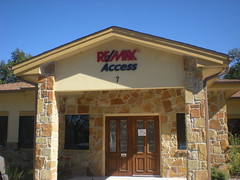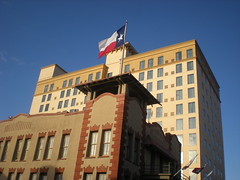Ever wonder what simple things you can change to go green that will make a huge difference in the environment? Baby steps might seem silly to some but in the grand scheme of things they can make huge differences. From hand washing your dishes to leaky toilets Karen Klages of the Chicago Tribune came up with the list below that was posted in our San Antonio paper.
THE DISHWASHER Use it. Contrary to popular eco-belief, it's greener than hand-washing - if you run it with full loads and scrape rather than rinse. The average dishwasher in American homes today uses 8.7 gallons of water a load. Washing by hand for 10 minutes with water running can use 20 gallons. If you fill the sink, you still use about 5 gallons for washing, 5 for rinsing.
LAUNDRYWash only full loads of laundry and save (in the average American home) as much as 3,400 gallons of water a year.
WATER FOR LAUNDRY Forgo hot water when doing laundry. Heating water to hot accounts for 90 percent of the machine's washing energy; only 10 percent goes to power the motor. Switching to cold can save the average household more than $400 annually with an electric water heater and $300 annually with a gas heater.
DRYING LAUNDRY Do not over-dry laundry. An electric dryer operating an extra 15 minutes a load can cost as much as $34 a year in wasted energy; a gas dryer, $21 a year.
If your dryer has a moisture sensor that turns the machine off when clothes are dry, use it.
DITCH THE LINT
GARBAGE DISPOSAL Use it. It's greener to feed the disposal than to encapsulate food waste in a plastic garbage bag and send it to the landfill. Sent down the disposal and into the sewer line, organic waste gets treated by the sanitary district and turned into fertilizer.
HOME ELECTRONICS
THERMOSTATS
LEAKY TOILET
It is estimated that two out of every 10 toilets in the United States leak, wasting as much as 146,000 gallons of water a year. That's enough water for a family of four to wash clothes in their washing machine for eight years.
NEWSPAPERS
LIGHT BULBS
Recycle CFLs responsibly. The mercury contained in compact fluorescent light bulbs should not be accumulating in a landfill or, even worse, incinerated. Home Depot stores accept CFLs for recycling.
PRINTER CARTRIDGES
Walgreens and OfficeMax offer in-store refilling stations in some of their stores. Bring in your empty printer cartridge and a store clerk will refill it on the spot (or in a matter of 10 minutes or so) and at a price that beats buying a new one.
E-WASTE
• Visit earth911.org for a list of collection sites. Some charge a fee.
• Through its Tech Recycling program, Office Depot will recycle as much e-waste as shoppers can fit into one of its prescribed boxes.
Cost is $5, $10 or $15, depending on the size of the box. Visit www.officedepot.com/techrecycling for the list of acceptable items.
SCREEN SAVERS
Get rid of them. It takes more energy to run those floating toasters or even a static image than it does to have your computer and monitor go into a low-power mode.
Unlike 10 years ago, the screen saver does not extend the life of your monitor. Killing it could save $50 to $100 a year on your electric bill.
WATERING THE GARDEN
NATIVE PLANTS
COMPOST
GARDEN POWER
Even better: manual equipment.
TREES
OLD CLOTHING
The Salvation Army, AMVETS and Unique Thrift Stores are three organizations that work hard to divert all types of unsold fabric from landfills.
(Many charities sell unsold clothes to textile recycling companies, which in turn sell wearable items to wholesalers overseas, where demand is high. The really worn stuff could be turned into cleaning cloths or filler inside your mattress or car's interior roof.)
REUSE Check out freecycle.org. It's a kind of eBay experience - but without the financial gain. The city-specific site allows people to post items they want to get rid of and others who live close by, in turn, to "shop" for something they need. No money is exchanged between parties.
KITTY LITTER Consider alternative litter. There are more earthy-friendly, organic options than the standard clay litters, which pile up in landfills. Among them: Feline Pine (made of pine), Sweat Scoop (wheat) and World's Best Cat Litter (corn). When it's time to change the litter, you can let organic litters biodegrade naturally by dumping them in your yard - far, far away from where kids may roam and from the veggie garden and compost. If you would rather not engage your yard, you still can go green with a biodegradable liner for the cat pan. (Biobags makes one; order at dirtworks.net).
DOGGIE WASTE Switch to eco doggie bags that biodegrade in the landfill - which means Fido's poop won't be forever preserved in the landfill, in the plastic bag you grabbed without considering its end-of-life issues. Among them: Chicago- (and corn-based) Poop Bags (poopbags.com) and biodegradable Pooch Pick-Up Bags from PetSmart stores.
ORGANIC SEAL OF APPROVAL The term "organic" should mean produced without chemical fertilizers, fungicides or herbicides - but it's best to ask. If you see the OMRI (Organic Materials Research Institute) seal, it means the product has met a strict standard.
PLASTIC BAGS Bring your own (string, canvas, any kind of reusable) bags to grocery stores and say "no" to the store's plastic bags. Americans toss some 100 billion of those low-quality polyethylene plastic bags annually and the recycling rate for them is a mere 0.6 percent. Each high-quality reusable bag has the potential of eliminating hundreds or even thousands of plastic bags over its lifetime.
PESTICIDES Avoid using them in your garden and yard. Instead, build up healthy soil instead to promote healthy plants and deter pests and disease. Wash aphids away with blast from the water hose. And learn to tolerate a few weeds, spots or insects if it's only an aesthetic problem rather than using herbicides.
FERTILIZERS Don't over-fertilize. Plants can absorb only so much; the rest washes away to pollute waterways. Follow directions or err on the side of less. Look for organic fertilizers that release nutrients slowly.
BATTERIES Walgreens stores in Chicago, for example, take back household batteries for recycling. So does any Chicago Public Library. All Office Depot stores take back cell phone and household batteries. All Staples and OfficeMax stores in the Chicago area take back rechargeable household batteries. Or visit earth911.org for a battery recycling site near you.
DISCRETE RECYCLE STATIONS Don't be quick to say "I don't have room to recycle all that." Or: "I hate the look of recycling bins in my kitchen." Try using attractive baskets and bins in corners where space is at a premium. They can be catchalls for recyclables such as batteries, printer cartridges and magazines you plan to pass along.
HAND SOAP Rediscover good ol' bar soap and eliminate the plastic bottle w aste that comes with using liquid soaps.
THE MICROWAVE Use it instead of the oven/stove to reheat food or cook small portions. You will reduce cooking energy by as much as 80 percent.
COOKING ON THE STOVE Match pots to the appropriate-size burner. A 6-inch pot on an 8-inch burner wastes more than 40 percent of the burner's heat. Using the right-size pot can save you as much as $36 a year with an electric range, as much as $18 with a gas range.
GET ORGANIZED Do your own (linen, storage) closet systems with a bunch of inexpensive clear plastic boxes/bins. Stash all sorts of household essentials in their own box - for instance, tape, ribbon, razors, soap, shampoo, etc. That way you can see what you already have at home and won't be tempted to overbuy.
MULTIPLE-USE PRODUCTS Pay attention to all the single-use items in your daily life - the throwaway plastic water bottles, paper napkins, paper towels, disposable wipes. And try to figure out alternatives: reusable water bottles; cloth napkins; microfiber dusting cloths that can be washed and reused; etc.
BRUSHING TEETH Turn off the tap when brushing your teeth and save as much as 10 gallons a day, a person. For a family of four, that's 14,600 gallons of water a year.
SODA CANS They're small, but not insignificant. Recycling one aluminum can saves enough energy to run a television or operate a computer for three hours.
WATER-SAVING PLANTING Plan for wise watering. Group thirsty plants in one bed close to the house. Fill farther beds with drought-tolerant perennials that need little or no watering. Mulch around trees and plants to keep water from evaporating.
GREEN DRIVING Keep up with your car's maintenance. Clean air filters can improve gas mileage by as much as 10 percent. Properly inflated and aligned tires improve mileage by about 3 percent.
SLOW DOWN Don't go super-fast. Driving 75 mph instead of 65 mph can cut fuel economy by as much as 15 percent.
CALM DOWN Don't drive aggressively. Speeding, rapid acceleration and hard braking can lower your highway gas mileage by as much as 33 percent and city mileage by as much as 5 percent.
_________________________________________________________________________________________________
Looking for information about homes in San Antonio? Kristin Moran, RE/MAX Access - The Moran Team "Sisters that sell", (210)313-7397, Kristin@KristinMoran.com.
Buy or sell a home from me, use our truck for free!





Comments(11)